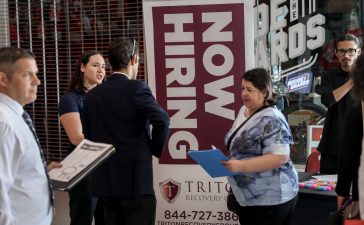Invezz.com –
Shein, the fast-fashion giant known for its ultra-affordable clothing and rapid production cycle cannot seem to catch a break.The company already suffered a setback last year when it had to scrap its original plans to list in New York after US lawmakers raised concerns over alleged labour malpractices and lawsuits from competitors, besides flagging the company’s “deep ties to China”.Now, ahead of a highly-anticipated IPO in London, the news flow related to the company’s practices is causing experts and analysts to wonder if Shein’s UK plans will meet the same fate as its US ambitions. The China-founded group that made more than $2bn in profits for 2023 and registered sales of $45bn on its website, was valued at $66 billion in its last funding round, and its IPO valuation is expected to hover around that figure.
Accusations of ‘tax dodging’ and impact of regulatory tightening
Earlier this week, Superdry’s chief Julian Dunkerton accused Shein of “dodging tax” and urged the UK government to get rid of the loophole which enabled the fashion major to export individual parcels directly to customers without paying any import duty.Dunkerton was referring to the rule that exempts shipments worth less than 135 pounds from import duties. Since Shein dispatches low-value parcels directly to customers from overseas, it is not charged an import duty on them. Before the rise of global online marketplaces, the tax exemption had little impact. However, US and EU retailers now face increasing competition from low-cost Chinese competitors, and state treasuries are missing out on potential tax revenue.In July, Simon Roberts, CEO of Sainsbury had also advocated for changes to this rule, seeking a level playing field for all retailers. Next CEO Lord Wolfson has called for the same. Earlier this month, the US reportedly took the lead in plugging this tax gap and proposed rules that would remove the exemption for Chinese goods in a move directly aimed at companies like Shein and Temu. While US said this “de minimis” rule has helped the two companies undercut competitors with lower prices, both Shein and Temu sought to impress that their popularity was not based on the tax rule but on their business models.Shein also said it supported reform of the de minimis exemption so that rules were applied “equally and evenly”. The EU too is reportedly drawing up plans to scrap the 150 euros threshold under which items can be bought duty-free. “An open question is how far Shein’s business model would be damaged if custom duties had to be paid,” Nils Pratley, Guardian’s financial editor wrote. Asserting that investors might need some convincing on this front, Pratley added:
Donald Tang, Shein’s executive chair, has argued in the past that the firm embraces reform in the name of “fair competition around the world” and has claimed tax breaks are “not foundational to our success.” Outside investors, one suspects, would want to see detailed evidence to support the latter claim. The core pitch to consumers is that the clothes are dirt-cheap; the customs duty advantage does not feel irrelevant.
Labour violations, design copying, and environmental issues
Apart from tackling accusatory claims about how its using regulatory loopholes to gain an upper hand over its competitors, Shein is also accused of forced labour in its supply chains.
In June, a human rights group urged Britain’s financial regulator to block Shein’s LSE listing as the company was using minority Uyghur people as forced labour at some of its cotton suppliers in the Xinjiang region. Amnesty International UK even said Shein’s potential London listing would be a “badge of shame” for the London market because of the fast-fashion firm’s “questionable” labour and human rights standards.Shein stated it had a zero-tolerance policy for forced labour and its manufacturers source cotton only from approved regions.In August, Shein, in its 2023 sustainability report admitted its found two cases of child labour and factories failing to pay the minimum wage in its supply chain last year. The company added that both cases were resolved swiftly with actions including terminating contracts with underage employees and other reliefs offered to them. An investigation this year by the Swiss-based non-profit group Public Eye also found that people employed to produce garments for Shein routinely work more than 70-hour weeks.The latest report by WIRED has documented how gig workers in China are vlogging about the allegedly precarious working conditions at Shein’s fulfilment centres on platforms like Bilibili. Apart from facing scrutiny for its alleged labour malpractices, Shein has also been sued by fashion majors like Uniqlo and H&M for copying their designs. On Thursday, Italy’s antitrust agency launched an investigation into a Dublin-based company that operated Shein’s website and app over possibly misleading environmental claims made on Shein’s website. Besides, Shein has attracted criticism for promoting disposable clothing and contributing to environmental pollution.
What happens to Shein’s IPO? Experts weigh in
While the US decided not to have the company list on its bourses after its lawmakers raised concerns discussed above, the jury is out on whether UK would be compelled to do the same. Signs of political pressure around its listing have already started to emerge in the UK. Earlier this month, Liam Byrne, the Labour MP who heads parliament’s business and trade committee called on the government to closely scrutinise Shein for possible links to forced working.Byrne told the Financial Times he would like to see a British version of the Uyghur Forced Labor Prevention Act from 2021, which bans the use of cotton from Xinjiang by companies in the US. He said:
My view is that we don’t have a Uyghur Forced Labor Prevention Act in Britain and therefore it is incumbent on ministers to satisfy them selves that Shein passes the highest standards on forced labour protections. That is something a Labour government might want to address.
Last month, London Stock Exchange Group (LON:) chief executive David Schwimmer emphatically denied there would be any “lowering of standards” to lure the fast-fashion retailer. Although he did not directly comment on Shein, Schwimmer has said that the exchange’s governance and disclosure regime tends to be “very good for companies in terms of having the disclosure and the scrutiny and the investor participating in how they are managed.”Sir Ian Cheshire, former chief of B&Q, who was also the former chairman of Barclays (LON:), said earlier this week that it would be better for the company to list in the UK as London-listed firms have to meet certain environmental quality controls. The alternative could be Shein listing on another exchange, which “might just let them do what they want”, he told the BBC’s Today programme. He said:
I would always vote for companies coming to London to be on the responsible side of the [green] transition and moving in the right direction.
He added that the government could fix the tax mismatch to enable retailers access a level-playing field. Meanwhile, Shein’s London IPO plans continue to be clouded with uncertainty.
This article first appeared on Invezz.com









